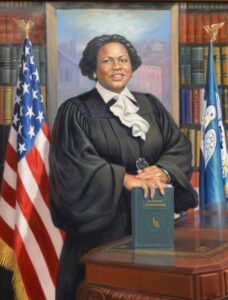Bernette Joshua Johnson
The first African American chief of the state’s judiciary

Louisiana Law Library
Portrait of Johnson by Ulrick Jean-Pierre, 2013.
Chief Justice Bernette Joshua Johnson was sworn in as the twenty-fifth chief justice of the Louisiana Supreme Court on February 1, 2013, a position she held until her retirement on December 31, 2020. She was the first African American chief of the state’s judiciary and the second woman to hold that position.
Born in Donaldsonville on June 17, 1943, Johnson grew up in New Orleans, where she graduated valedictorian of her class at Walter Cohen High School. After obtaining a bachelor’s degree while on scholarship from Spelman College in Atlanta in 1964, Johnson attended the Louisiana State University (LSU) School of Law. She became one of the first African American women to graduate from LSU’s law program, earning a juris doctorate in 1969. While a law student, Johnson interned with the US Department of Justice Civil Rights Division and worked on cases filed to implement the Civil Rights Act of 1964. She also clerked for Ernest N. “Dutch” Morial, who was a juvenile court and state appellate court judge before being elected mayor of New Orleans in 1977.
Community service and a calling to work toward social justice on behalf of the poor, the elderly, and the disadvantaged have been hallmarks of Johnson’s career. In the 1960s she volunteered to be a community organizer for the National Association for the Advancement of Colored People’s Legal Defense and Educational Fund. She worked with community groups in several southern states to disseminate information about school desegregation decisions, encouraging parents to enroll their children in newly desegregated schools. Johnson organized household workers, who, with her assistance, were successful in their efforts to obtain Social Security benefits and to earn the minimum wage.
After receiving her law degree, Johnson became the managing attorney at the New Orleans Legal Assistance Corporation (NOLAC) from 1969 to 1973. She worked as a rape counselor from 1974 to 1977, and as a practicing attorney she litigated numerous cases in federal and state district courts, as well as in juvenile court. Johnson served as deputy city attorney for the city of New Orleans from 1981 to 1984. During her tenure she gained extensive experience in the Civil District Court in Orleans Parish and the New Orleans–based US District Court for the Eastern District of Louisiana, litigating police brutality and tort claims filed against the city. Johnson was elected to the Civil District Court in 1984, becoming the first woman to serve as a judge in that jurisdiction. She was reelected in 1990 and elevated to chief judge in 1994.
Johnson was appointed as an associate justice to the Louisiana Supreme Court, effective October 31, 1994. Johnson’s appointment was the result of a consent decree granted by the US Fifth Circuit Court of Appeals to enable the election of an African American to the Court. That order settled a lawsuit that claimed Louisiana’s system of electing justices violated the Voting Rights Act of 1965 and diluted African American voting strength in the state. This so-called Chisom seat on the Supreme Court bench (named after the plaintiff in the suit) expired after Johnson ran for a newly created Seventh Supreme Court District and won that election in 2000. She was reelected for a ten-year term in 2010 and will retire on December 31, 2020.
Johnson became the state’s first African American chief justice in February 2013, but only after a highly publicized dispute about whether she had sufficient seniority to qualify for the position. When former Chief Justice Catherine Kimball announced in 2012 that she would retire, Johnson had the most seniority of the remaining justices and was poised to succeed her as chief justice. A racially tinged controversy arose, however, when Kimball suggested that Johnson’s six years of appointed service on the Louisiana Supreme Court prior to her election in 2000 should not count toward her seniority for the chief justice position under the state constitution. Justice Jeffrey Victory, who is white, joined the high court one year after Johnson, in 1995, and would have been next in line for the post. Johnson filed a lawsuit in US District Court in July 2012 after fellow justices said they would debate whether she or Victory would replace Kimball. That September a federal judge ruled that Johnson had more seniority but did not order the Louisiana Supreme Court to declare her chief justice. The next month the Louisiana Supreme Court justices concurred with that decision, and Johnson became chief justice on February 1, 2013, the day after Kimball’s retirement took effect.
Johnson has received the Joan Dempsey Klein Award from the National Association of Women Judges; the Margaret Brent Women Lawyers of Achievement Award and the Spirit of Excellence Award, both from the American Bar Association; the Distinguished Jurist Award from the Louisiana Bar Foundation; and an honorary doctorate of law from Spelman College. She has held adjunct professorships at Southern University at New Orleans (1978–1992) and Tulane Law School.
